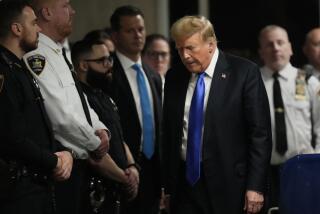OSWALD SKEPTICS’ NIGHT IN COURT
- Share via
Finally, it’s gone to court. Tonight’s the night that a jury decides the guilt or innocence of Lee Harvey Oswald.
Sort of.
This is not a real--entirely real--trial, anyway. It’s the 8 p.m. conclusion of “On Trial: Lee Harvey Oswald,” a two-part, 5 1/2-hour Showtime special that tries in absentia the man confirmed by the Warren Commission as the sole assassin of President John F. Kennedy 23 years ago in Dallas.
There are many skeptics, though, and pay-cable Showtime gives them their nights in court.
“On Trial” is an extraordinary undertaking in many ways, a British production without professional actors, excluding the trial lawyers who showboat in this Dallas courtroom. There is no script.
The prosecutor is the famed Vincent Bugliosi, who prosecuted Charles Manson for the Tate/LaBianca murders. Defending Oswald is flamboyant Gerry Spence, who won a judgment against Kerr-McGee in the Karen Silkwood case.
U.S. District Judge Lucius Bunton was recruited and a real jury empaneled to hear 18 hours of testimony from actual eyewitnesses and a slew of experts, all of which was edited into two nights of enthralling TV. Oswald’s widow, Marina, refused to participate.
Bugliosi presented his case Friday night, and Spence gets his turn in tonight’s two-and-a-half-hour segment, in which the jury gives its verdict and viewers are invited to vote themselves via telephone numbers that will be flashed on the screen. Viewer verdicts from the eastern and central time zones will be announced at the end of tonight’s program and the others at a later date.
Showtime is repeating the two segments of “On Trial” Dec. 1-2, at 10 p.m. and 10:15 p.m. respectively.
Even after all these years, memories of Kennedy’s death still evoke macabre fascination as well as melancholia. Still lingering are the conspiracy theories and enigmas of Oswald and his own assassin, the shadowy Jack Ruby.
Perhaps even more significant, though, J.F.K.’s assassination was the first in a string of violent acts against contemporary national leaders (the murders of the Rev. Martin Luther King Jr. and Robert Kennedy and attempted murder of President Reagan were others) that seem to have desensitized and hardened America.
So much so, in fact, that you don’t even wince when John Kennedy’s “splattered” brain is discussed in detail in open court.
Some of the “On Trial” testimony is jolting, and at the end of the program you may have reasonable doubt of Oswald’s guilt or that he acted alone.
Friday night ended with an engrossing contest of wits and wills between Spence and the woman with whom the Oswalds stayed in Dallas. And tonight, Bugliosi tries his best to clobber Dr. Cyril Wecht, a Pittsburgh pathologist, a critic of the “single bullet” theory.
There are bits of “business” going on here. Spence is folksy, crafty and expansive, Bugliosi terse and intense. Spence always refers to Oswald as “Lee,” not-so-subtly trying to soften the image of his “client.” Bugliosi addresses Wecht as “Cyril,” trying to diminish the pathologist’s stature.
The cameras may alter reality, and showing less than a third of the testimony hardly qualifies as a real trial. Moreover, the telecast is shorn of the legal pit stops that always slow down actual court proceedings.
Yet “On Trial” is not to be confused with the likes of “People’s Court” or other TV law renderings. It is very close to the real thing and includes many of the rough edges missing from ersatz cases. The lawyers are, in effect, trying an actual case, and the witnesses are giving actual testimony, sometimes under duress. And if the emotions aren’t genuine, then these witnesses are among the world’s best amateur actors.
The posturing is by lawyers, not witnesses, proving that real people telling real stories are far more compelling and believable than characters speaking dialogue.
Now, the verdict.
More to Read
The complete guide to home viewing
Get Screen Gab for everything about the TV shows and streaming movies everyone’s talking about.
You may occasionally receive promotional content from the Los Angeles Times.






